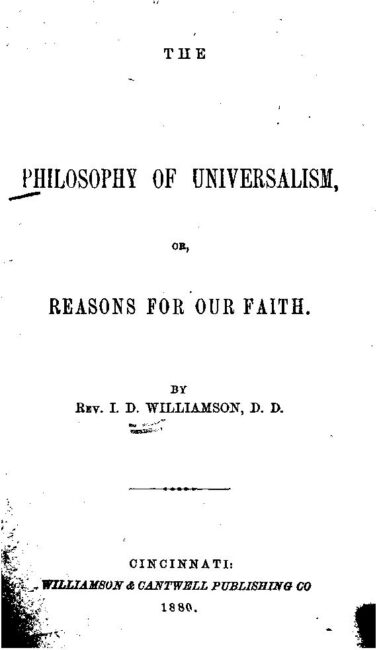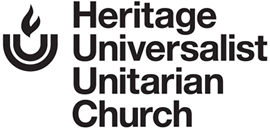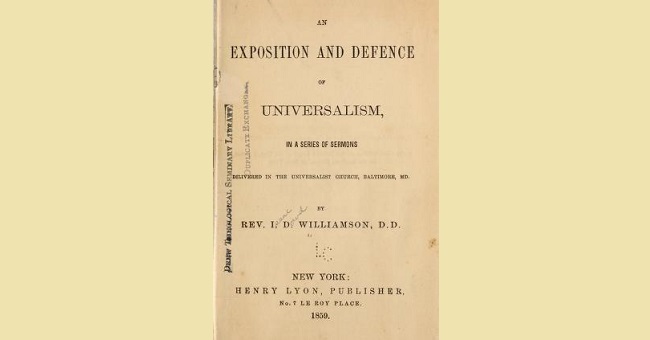by Mike Roberts, Church Historian
Our current minister, The Reverend Bill Gupton, is now the longest standing minister in the history of the congregation. However, a minister from the middle of the 19th century may have had the longest association with the First Universalist Society of Cincinnati. His name was Isaac Dowd Williamson.
Williamson was born on April 4, 1807 in Pomfret, Vermont. His parents were Ransom Williamson and Jerusha Miller. He trained for the trade of clothier but while working in the local mills was drawn to be a minister when he read some of the works of Hosea Ballou. This led to his eventual ordination as a Universalist minister at Townsend, Vermont on September 10,1829.
Before his tenure in Cincinnati, Williamson ministered to churches in Langdon and Jeffrey, New Hampshire; Albany and Poughkeepsie, New York; Baltimore; New York City; Philadelphia; Mobile, Alabama; Memphis, Tennessee; Charleston, South Carolina; and, Lowell, Massachusetts. Some of Reverend Williamson’s pastorates were temporary as he suffered from a very severe form of asthma and long-term commitments to the pulpit were difficult for him. Also, periodically, doctors recommended that Williamson make sojourns into the South for the sake of his health. These Southern trips were to have a profound effect on his view of slavery and abolition. Eventually, Williamson settled in Cincinnati in the late 1840’s. During his early years in the city, he joined the First Society Church and helped edit and wrote for the Star in the West, the local Universalist newspaper. Williamson also served as a stand-in for Reverend Abel Thomas during his leave of absence due to illness in 1846.
In 1854, Williamson was hired to serve as our full-time minister, thus bringing a familiar face to the pulpit for the First Society. One of his first duties was preaching the dedication ceremony at the new Plum Street church on September 24, 1854. He remained committed to the pulpit as his health allowed but there was frequent mention of leaves granted to him to escape the city and relieve his asthma issues. During these absences, local ministers were hired at a daily rate to preach the Sunday sermon. One issue resolved during his tenure was to adopt the practice of celebrating the Eucharist every first Sunday of March, June, September and December at a 3 p.m. ceremony.
Williamson eventually asked for relief from his pastoral duties due to his health. The church was slow to respond but eventually granted his wish and Williamson gave up the pulpit in 1857. While this ended his tenure as minister, it did not end his association with the church. Williamson continued to attend the Cincinnati church regularly and served on its Board of Trustees. As well, he was asked to return a third time after the departure of his replacement, George Flanders. Williamson agreed to serve only as pastor in the delivery of Sunday sermons and was paid per sermon during this period of service. He undertook no other ministerial duties with the church. Even after a new minister was hired, he continued throughout the 1860’s to serve as a substitute upon the absence of the minister and continued as a member until his death.
Throughout his life, Williamson was a prolific writer. His book Endless Misery Examined and Refuted sold over 25,000 copies. His work Philosophy of Universalism was as apt an explanation of the religion as existed in his era. At times he was at odds with other Universalist thinkers. His stance on abolition was one of those points of disagreement. Williamson had very negative thoughts about slavery but also felt that the abolition of slavery and the freeing of slaves was not in the best interests of those slaves. He based much of this feeling on witnessing in Baltimore how poorly freedmen existed. He also expressed the belief that abolitionists often exaggerated the evils of slavery. Despite sometimes being at odds with his co-religionists, Isaacson was at one time selected to chair a national convention called to study the “State of the Church”.
During his long stay in Cincinnati, Williamson became a co-editor and proprietor of the Star in the West and maintained those positions for nearly ten years. During his long tenure with the church, The First Society continually suffered financial difficulties which lasted for decades. These challenges seemed to center on several issues. One was the lack of revenue generated by pew rentals. Another centered around bequests made to the church by a deceased member. In his will, a Mr. Robson left a downtown building to the church. It was supposed to generate funds through rentals but seemed to drain out more money than it took in. Finally, a national economic crash in 1857 added to the financial woes. With a mortgage on a new church building to pay off, there was repeated mention of “financial embarrassment” in the Board of Trustees minutes during these years.
Brother Williamson was also known for playing a major role in the International Order of Odd Fellows. He held many offices in the national organization including that of Grand Chaplain of the United States. One of his duties was to travel to England to meet with members of the organization there. While crossing the Atlantic, Williamson was asked to serve the spiritual needs of the ship and delivered several sermons. Attending these sermons was passenger Washington Irving who declared that he fully agreed with Reverend Williamson’s doctrines and tried to practice them in his own life.
Williamson died of dropsy in Cincinnati on November 26, 1876. His funeral was conducted at the Plum Street church. He was interred at Spring Grove Cemetery.
Williamson married Adeline Guernsey in 1829 and their marriage produced six children, four of whom were still living at his death. One daughter, Orphia, married John S. Cantwell, a highly respected Universalist minister.


